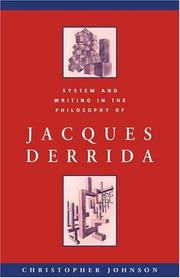| Listing 1 - 4 of 4 |
Sort by
|
Book
ISSN: 0298315X ISBN: 9782204084901 2204084905 Year: 2008 Volume: *5 Publisher: Paris: Cerf,
Abstract | Keywords | Export | Availability | Bookmark
 Loading...
Loading...Choose an application
- Reference Manager
- EndNote
- RefWorks (Direct export to RefWorks)
A son corps défendant, l'humain se découvre animal. Mais comment se dire humain ? Jadis, la question se posait avec une urgence et une acuité terribles parce que l'on se sentait toujours trop proche de cet animal que l'on devait tuer pour pouvoir s'en nourrir, et la réponse était celle qu'apportait le rituel du sacrifice sous l'horizon du divin. Avec le temps, cette organisation rituelle va considérablement évoluer, notamment à l'occasion de la diffusion des pratiques de l'écriture, entraînant une redéfinition radicale de l'humain. Aujourd'hui, cette redéfinition a pris une ampleur telle que l'expérience vécue de l'animalité a pratiquement disparu dans nos sociétés. Mais l'inquiétude demeure : l'homme se sait différent, mais il ne sait plus de quoi il diffère au juste. L'Humanité tragique explore la part que prend l'écriture dans cette redéfinition radicale de l'humain, en décrivant l'émergence conjointe de la démocratie athénienne et du théâtre tragique. En effet, c'est à travers des pratiques singulières d'écriture que la cité a forgé des moyens révolutionnaires pour évacuer l'autre en soi et affirmer l'humain en montrant l'inhumain : ainsi naît le théâtre tragique. Dans cette perspective, Frank Pierobon propose, dans la dernière partie de l'ouvrage, une discussion des principaux concepts de la Poétique d'Aristote.
Theory of knowledge --- Writing --- Tragic, The. --- Ecriture --- Tragique --- Philosophy. --- Philosophie --- Aristotle. --- Philosophy --- Tragic, The --- Chirography --- Handwriting --- Aristoteles. --- Ἀριστοτέλης. --- Language and languages --- Ciphers --- Penmanship --- Writing - Philosophy --- Aristotle. - Poetics --- Aristote (0384-0322 av. J.-C.). Poétique --- Humanité --- Écriture --- Théâtre antique --- Anthropologie philosophique

ISBN: 0521448522 052141492X 0511553951 0511880294 9780521448529 9780511553950 9780521414920 Year: 1993 Volume: 40 Publisher: Cambridge: Cambridge university press,
Abstract | Keywords | Export | Availability | Bookmark
 Loading...
Loading...Choose an application
- Reference Manager
- EndNote
- RefWorks (Direct export to RefWorks)
This is an important, critical analysis of Derrida's theory of writing, based upon close readings of key texts ranging from his stringent critique of structuralist criticism to his sympathetic and dialogical analysis of Freud's scriptural models. It reveals a dimension of Derrida's thinking which, although consistently present in his works, has been neglected in favour of those 'deconstructionist' clichés used in much recent literary criticism. Christopher Johnson highlights the special character of Derrida's philosophy that comes from the fertilising contact that Derrida has had with contemporary natural science and with systems theory. In addition, he shows how Derrida's philosophy of system and writing rejoins an atomist and materialist tradition repressed by centuries of idealist metaphysics. This study casts fresh light on an exacting set of intellectual issues facing philosophy and critical theory today.
Derrida, Jacques --- Writing --- System theory --- Philosophy. --- Philosophy --- Derrida, Jacques, --- Chirography --- Handwriting --- Language and languages --- Ciphers --- Penmanship --- Systems, Theory of --- Systems science --- Science --- Derrida, Jacques. --- Derrida, J. --- Derida, Žak --- Derrida, Jackes --- Derrida, Zhak --- Deridah, Z'aḳ --- Deridā, Jāka --- Dirīdā, Jāk --- Деррида, Жак --- דרידה, ז'אק --- Arts and Humanities --- Literature --- Writing - Philosophy --- Derrida, Jacques, - 1930-2004 --- System theory.
Book
ISBN: 2866456270 9782866456276 Year: 2006 Volume: *3 Publisher: Paris: Le Félin-Kiron,
Abstract | Keywords | Export | Availability | Bookmark
 Loading...
Loading...Choose an application
- Reference Manager
- EndNote
- RefWorks (Direct export to RefWorks)
Existentialism. --- Writing --- Existentialisme --- Ecriture --- Philosophy. --- Philosophie --- Kierkegaard, Sren, --- Criticism and interpretation. --- Biography --- Psychology. --- Existentialism --- Philosophy and culture --- Philosophy --- Kierkegaard, Søren, --- Criticism and interpretation --- Psychology --- Danish Philosophy --- 19th Century --- Critical Essay --- Writing - Philosophy --- Kierkegaard, Søren, - 1813-1855 - Criticism and interpretation --- Kierkegaard, Søren, - 1813-1855 - Psychology --- Kierkegaard, Søren, - 1813-1855 --- Critique et interprétation --- Kierkegaard, Søren, 1813-1855
Book
ISBN: 9782713223181 2713223180 Year: 2011 Volume: 1 Publisher: Paris: École des hautes études en sciences sociales,
Abstract | Keywords | Export | Availability | Bookmark
 Loading...
Loading...Choose an application
- Reference Manager
- EndNote
- RefWorks (Direct export to RefWorks)
Automne 1968 : Foucault, à l'invitation du critique Claude Bonnefoy, rencontre celui-ci à plusieurs reprises en vue d'un projet de livre. Ce n'est ni à un entretien, ni à un dialogue auquel les deux hommes se livrent, mais à un exercice de parole inédit ; Foucault pour la seule fois de sa vie donne à voir ce qu'il désigne comme "l'envers de la tapisserie", son propre rapport à l'écriture.
Writing --- Ecriture --- Philosophy --- Philosophie --- Foucault, Michel, --- Interviews. --- Chirography --- Handwriting --- Language and languages --- Ciphers --- Penmanship --- Foucault, M. --- Foucault, Michel --- Fūkūh, Mīshīl, --- Foucault, Michael, --- Fuko, Mišel, --- Pʻukʻo, --- Pʻukʻo, Misyel, --- Phoukō, Misel, --- Fuke --- 福柯 --- Fuḳo, Mishel, --- Fūkūh, Mīshīl, --- Fuko, Mišel, --- Pʻukʻo, --- Pʻukʻo, Misyel, --- Phoukō, Misel, --- 福柯 --- Fuḳo, Mishel, --- Writing - Philosophy - Interviews --- Foucault, Michel, - 1926-1984 - Interviews --- Foucault, Michel, - 1926-1984 --- Foucault, Michel (1926-1984) --- Entretiens --- Philosophy.
| Listing 1 - 4 of 4 |
Sort by
|

 Search
Search Feedback
Feedback About UniCat
About UniCat  Help
Help News
News